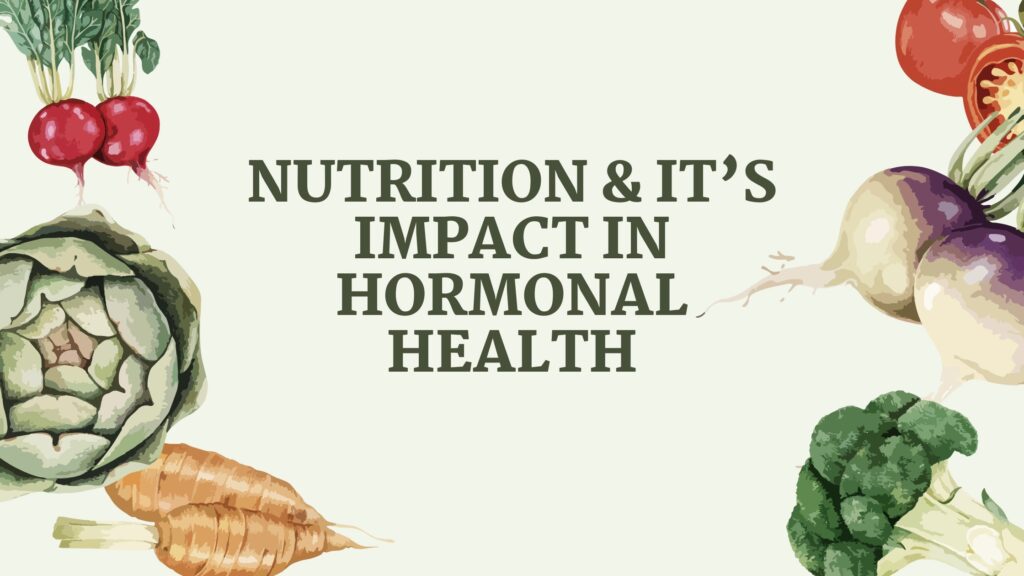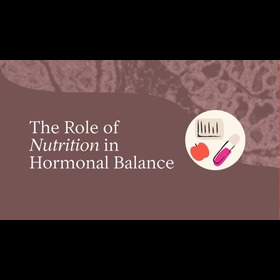Introduction:
Hormones might seem like invisible messengers quietly working in the background, but the foods you eat can make or break their balance. Curious how nutrition shapes your hormones and what you should eat (or avoid) for better health? Read on to find out:

Hormones and their dietary triggers
Hormones are the chemicals that coordinate various bodily functions by carrying messages through the bloodstream to different organs, muscles, and tissues. Hormones control many different bodily processes in the body, including:
- Metabolism
- Homeostasis (constant internal balance)
- Reproduction
- Growth and development
- Sexual function
- Mood
- Sleep–wake cycle
When hormones are balanced, we feel healthy, emotionally stable, and energized. However, fluctuations in hormones can lead to issues like weight gain, mood swings, fatigue, irregular periods, and acne.
A hormonal imbalance can occur in a person when he/she has too much or too little of one or more hormones. Some people experience hormonal imbalance due to various reasons such as stress, steroid use and certain medications, tumours, autoimmune conditions, and poor diet.
Hormones are produced by glands in the endocrine system and rely on various factors to function properly. A poor diet, such as one high in processed foods, sugars, and unhealthy fats, causes inflammation, disrupting hormone production and leading to long-term health issues like thyroid disorders, PCOS, diabetes, and metabolic syndrome.
Best foods for balance (seeds, leafy greens, fatty acids)
To support a healthy endocrine system, it is really crucial to include specific nutrients in the diet, such as seeds, leafy greens, fatty acids, etc.
Healthy fats:
Fats are essential for hormone production; as part of it, our body needs good fats to synthesize hormones like testosterone and estrogen.
Good sources of fats include:
- Fatty fish (sardines, salmon)
- Avocados
- Nuts and seeds (chia seeds, flaxseeds, walnuts, almonds)
- Olive oil
- Coconut oil
These foods can help lower inflammation and keep your cells healthy, which helps your hormones work better.
Protein-rich foods:
Proteins and lipids (including fatty acids) play a crucial role in hormone synthesis and function. The best sources include yogurt, eggs, chicken, quinoa, lentils and chickpeas, paneer, and fish.
Adding good protein to every meal not only helps balance hormones but also keeps your blood sugar steady and supports your muscles.
Fiber:
Fiber aims to remove excess estrogen from the body, preventing hormonal imbalances that can lead to conditions like estrogen dominance and PCOS.
Best sources of fiber are:
- Beans and lentils
- Whole grains (oats, brown rice)
- Broccoli, sprouts, cauliflower
- Leafy greens (spinach, kale)
Crucial minerals and vitamins:
- Magnesium (for hormone production & stress relief)—highly found in spinach, almonds, and bananas
- Zinc (boosts reproductive health & immunity)—highly found in seafood, pumpkin seeds
- Vitamin D (supports reproductive hormones & thyroid)—found in eggs, sunlight, and fortified dairy
- Selenium (essential for thyroid health)—found in fish, nuts, and sunflower seeds
Proper meal planning for hormonal health is essential in a woman’s daily life, as it helps maintain hormonal balance, supports energy levels, improves mood, and promotes overall well-being.
Foods to avoid (sugar, processed items)
Some foods trigger inflammation, raising insulin resistance and disrupting hormonal signals in the body. Limiting or avoiding these foods can improve hormonal health:
Processed foods: Processed foods such as frozen meals, fast food, and packaged snacks can increase inflammation.
Refined sugar: Excess sugar increases insulin, leading to hormonal imbalances and weight gain.
Caffeine and alcohol: Consuming high amounts of alcohol and caffeinated drinks can disrupt sleep, increase cortisol, and affect reproductive hormones.
Dairy & Gluten: These products can contribute to inflammation and hormonal acne in some people.
Healthcare professionals suggest reducing these hormone-disrupting foods and focusing on whole, natural ingredients, which can help restore balance in the body.
Supplements and herbs
Several supplements and herbs can support hormonal balance. Although research on this topic is limited, some evidence suggests that specific herbs could influence hormone levels and other related functions of the endocrine system.
Herbal remedies may be safe for some people, yet dangerous for others. Hence, before using herbs or any other type of therapy, consulting the doctor or other healthcare professional can be essential to avoid any risk of experiencing dangerous side effects.
The following are some of the common supplements and herbs that can be used to control the hormonal imbalance, such as:
- Nigella seeds
- Ashwagandha
- Black cohosh root
- Chasteberry
- Marjoram
Conclusion:
Maintaining hormonal balance through proper nutrition isn’t just about feeling good—it’s about protecting long-term reproductive and overall health. For personalized guidance and to address any persistent symptoms, consulting a gynecologist can help create the right dietary and lifestyle plan tailored to your needs.
FAQ’s for Nutrition and Hormonal Balance in Women: What to Eat for Better Health
Hormones play a crucial role in women, especially in regulating different bodily functions such as metabolism, reproductive processes, mood, growth, and the sleep–wake cycle.
People experience hormonal imbalance due to various reasons, such as stress, steroid use and certain medications, tumours, autoimmune conditions, and poor diet
Healthy fats, protein-rich foods, fiber, leafy greens, seeds, and nutrient-rich foods like fatty fish, avocados, quinoa, and nuts help maintain balance.
Limit processed foods, refined sugar, excessive caffeine, alcohol, and, in some cases, dairy and gluten.
A poor diet high in sugars, processed foods, and unhealthy fats can cause inflammation, disrupt hormone production, and lead to conditions like PCOS, thyroid disorders, and diabetes.
Certain supplements and herbs like ashwagandha, chasteberry, and nigella seeds may help, but they should only be taken after consulting a healthcare professional.
Proper meal planning helps maintain hormone levels, boosts energy, stabilizes mood, and supports overall well-being.




